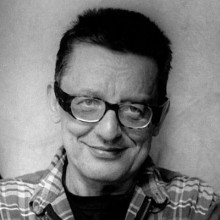Polish literature

Andrzej Bart
(born 1951) writes fiction, screenplays and documentary films.
Bart’s first novel (The Man the Dogs Didn’t Bark At) did not attract much attention, but his next one, Rien ne va plus, won critical acclaim and an admiring readership, as well as the prestigious Kościelski Award. In each of his books the storyline develops out of a superb idea. In Rien ne va plus a portrait that has powers of awareness makes its way from Italy to Poland, where for two hundred years it watches the nation’s concerns and passes cutting comment on them. Thus the outlook of an Italian libertine (the ghost trapped inside the picture was once the Duke d’Arzipazzi) clashes with the Polish mentality to comical effect. Similarly, in A Train to a Journey Bart uses the classic device of time travel. Two American agents have been sent to Vienna in the early twentieth century on a mission to assassinate the young Hitler and thus to save the world from the Second World War. Another equally mad and effective story, The Fifth Rider of the Apocalypse (published under a pseudonym) is about saving the world from the advent of the Anti-Christ and total destruction. Once again the secret services go into action. Don Juan Rides Again, Bart’s most impressive book to date, is also based on a brilliant idea. This colourful, erudite novel is about the historical story of Queen Joanna of Castile’s love for her dead husband, Philip the Handsome. The desperate queen will not allow the king’s body to be buried, which in the early sixteenth century has caused a scandal throughout Catholic Europe. To this authentic story Bart has added his own fantasy – brought from a monastery where he has hidden away after his dissolute life, Don Juan is supposed to get the queen to change her mind. For the sake of the mission he casts off his monk’s habit and assumes the persona of the king’s comrade from his military expeditions. Gradually he gains the widow’s trust and sympathy. But with each successive page, rather than getting more complicated the intrigue keeps branching off in new directions, forming separate plots including a thriller, a crime story and a romance.
In his review of one of Bart’s books, Marek Zaleski made a comment that can be successfully applied to all his works: “Without pretending to be a masterpiece, this novel goes far beyond the expectations we have of good popular literature.” Essentially, Andrzej Bart is an expert at producing elegant popular fiction and is admired for his intelligent, dazzling novels that aim to provide entertainment at the highest level, where entertainment means revelling in style, allusions and refined jokes.
BIBLIOGRAPHY
- Człowiek, na którego nie szczekały psy, Łódź: Wydawnictwo Łódzkie, 1983 [under the name: Bart-Sołtysiak].
- Rien ne va plus, Łódź: Poprzeczna Oficyna, 1991.
- Pociąg do podróży, Montricher: Noir sur Blanc, 1999.
- Piąty jeździec Apokalipsy, Montricher: Noir sur Blanc, 1999 [under the name: Paul Scarron Junior].
- Rien ne va plus, Kraków: Wydawnictwo Literackie, 2005.
- Don Juan raz jeszcze, Kraków: Wydawnictwo Literackie, 2006.
- Fabryka muchołapek, Warszawa: W.A.B., 2008.
- Rewers, Warszawa: W.A.B., 2009.
- Bezdech, Warszawa: W.A.B., 2013.
TRANSLATIONS:
Czech:
- Továrna na mucholapky [Fabryka muchołapek], transl. Jiří Červenka, Praha: Fra, 2011.
French:
- Rien ne va plus, transl. Elisabeth Destrée-Van Wilder, Montricher [Paris]: Les Éditions Noir sur Blanc, 1991.
- Le goût du voyage [Pociąg do podróży], transl. Éric Morin-Aguilar, Montricher [Paris]: Les Éditions Noir sur Blanc, 1999.
- Le cinquième cavalier de apocalypse [Piąty jeździec Apokalipsy], transl. Grażyna Erhard, Montricher [Paris]: Les Éditions Noir sur Blanc, 1999.
- Don Juan, une fois encore [Don Juan raz jeszcze], transl. Robert Bourgeois, Lausanne [Paris]: Les Éditions Noir sur Blanc, 2009.
- La fabrique de papier tue-mouches [Fabryka muchołapek], transl. Erik Veaux, Lausanne [Paris]: Les Éditions Noir sur Blanc, 2019.
German:
- Die fliegenfängerfabrik [Fabryka muchołapek], transl. Albrecht Lempp, Frankfurt am Main: Schöffling, 2011.
- Knochenpalast [Rewers], transl. Albrecht Lempp, Frankfurt am Main: Schöffling, 2014.
Hebrew:
- Beyt harŵšet l-malkŵdŵt zbwbiym [Fabryka muchołapek], transl. Anat Zajdman, Or Yehuda: Kinneret Zmora 2011.
- Halŵk wa-šŵb [Rewers], transl. Anat Zajdman, Tel Aviv: Keter, 2012.
Hungarian:
- Rien ne va plus, transl. Lajos Pálfalvi, Budapest: Európa, 2005.
Macedonian:
- Fabrika na smrtta [Fabryka muchołapek], transl. Michaił Barakovski, Skopje: Makedonska Rech 2011.
Russian:
- Fabrika muchoboek [Fabryka muchołapek], transl. Ksenia Starosielska, Moskva: Mosty Kultury/Geszarim, 2010.
Serbian:
- Fabrika muholovki [Fabryka muchołapek], transl. Vesna Milutinović-Đurić, Beograd: Zavet, 2014.
Slovenian:
- Tovarna muholovk [Fabryka muchołapek], transl. Jasmina Šuler Galos, Ljubljana: Litera Publishing House, 2011.